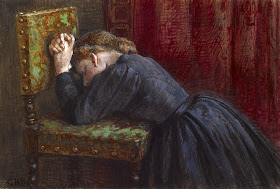I normally quote saints as we explore the inner cloister, but the following words from Anne Morrow Lindbergh are so perfect that I cannot pass them up. When speaking of an absorbing book, Mrs. Lindbergh wrote: 'You merged into it, so that when you walk out of it you still have bits of it sticking to you. You live through a thin veil of it for awhile - the way, sometimes, you live half a morning through the veil of last night's dream.' (from Bring Me a Unicorn, 1972, Harcourt Brace Jovanovich, NY, p. 225)
I find these words poignant and descriptive. And I wonder: what books am I merging into? What writings and other influences am I carrying around, allowing bits of them to stick to me? What examples and thoughts and ideas am I veiled with as I go through the day?
I desire to see and respond to every circumstance through Scripture and Church teaching, and thankfully there are books for this. I have the Holy Bible to 'merge into,' and I do not have to do this merging on my own. It is the Holy Spirit Who helps Scripture take root in my heart.
I also appreciate and need examples. Stories of people whose heroism and courage slide over me like a veil, tales of saints that leave bits of zeal stuck to my will.
'Finally, brothers, whatever is true, whatever is noble, whatever is right, whatever is pure, whatever is lovely, whatever is admirable - if anything is excellent or praiseworthy - think about these things.' (Philippians 4:8)
'Now there are certain things that strengthen the prominence of evil thoughts in us: bad companions, bad books, a forgetfulness of daily duties, and the viscious habits that result. But of all these, bad books are the worst. They are the plague of the present day. A book is bad not only when it contains impure and immoral thoughts, but when it gives false ideas, pretending to be the judge of everything, to ridicule everything sacred or honorable. These sorts of books are all the worse when they are beautifully written, as they generally are. They debase the taste, making healthy food seem disgusting.... Forgive me for saying all this; but I know your passion for reading, and all I would venture to say to you is this: don't play with poison.' (St. Theophane Venard)
For personal reflection:
- Have I ever read a book by or about someone given over to God, and yearned to love Him with that person’s abandonment?
- Have I read (or watched, or listened to) things that have left me confused about God, unsure about truth, or tempted toward sin? Do I ever had a hard time getting such things unstuck from my mind?
(Parts of this post are taken from our archives)
Text not in quotes
Painting: Josef Wagner-Höhenberg Lesender, in US public domain due to age
- Have I read (or watched, or listened to) things that have left me confused about God, unsure about truth, or tempted toward sin? Do I ever had a hard time getting such things unstuck from my mind?
(Parts of this post are taken from our archives)
Text not in quotes
Painting: Josef Wagner-Höhenberg Lesender, in US public domain due to age































